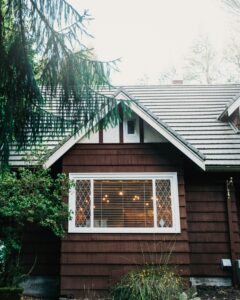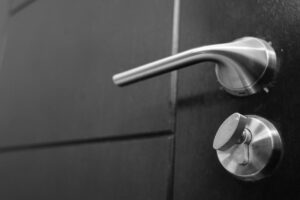Budget is an important consideration in all aspects of our lives—from groceries to housing to retirement savings and more. That, of course, includes home security. A budget is a crucial consideration that balances security measures, financial realities, and cost savings. This includes the cost of homeowner’s insurance (and any discounts available) as well as the increased costs to repair or replace belongings if your home is burglarized or damaged. Fortunately, it is possible to better secure your home on a budget.

Secure Your Home on a Budget: Here’s How
In most households, there’s only so much money to go around. Thus, budgeting is just part of life. And one of the budget considerations is to keep your home and family safe.
There are some fairly simple, cost-effective measures almost anyone can take to significantly enhance their home’s security. These include:
- Reinforced locks (e.g., deadbolts). Ensuring you have good, robust locks on exterior doors makes them harder to get through. Adding strike plates that use longer screws is another way to strengthen door frames, which makes them harder to bust through.
- Smart locks and doorbell cameras. These new devices are readily available. While there are upfront costs, they can be a good investment, even for those on a tighter budget. They offer a cost-effective security measure over the long run by deterring a break-in. Or, in the unfortunate event of a break-in, they can also provide evidence to help catch the intruder.
- Sturdy window locks. Locking windows, especially those on the ground floor, is an important way to stop or at least slow an intruder. If you have sliding windows or doors, adding a wooden dowel or metal rod in the slider when the door is closed (or just slightly ajar) can prevent it from being opened from the outside.
- Motion sensor lighting. Installing lighting around the home’s exterior is an inexpensive option that works well. Intruders are less likely to approach a house that’s well-lit.
- Security window films. One surprising option is to make it harder to break windows. There are several window films available, such as BDF S8MC, Hohofilm, or VViViD. This may not be the most high-tech, but it can be an effective and affordable option to help secure your home on a budget.
- Timers on lights. If you’re going to be away from home, you can set up your lights to turn on automatically. This can make it appear as if someone is home, which can thus deter intruders.
- Coordinating with neighbors. Participating in (or perhaps starting) a neighborhood watch is a good way to get to know the people around you and encourage you to keep an eye out for each other and report suspicious activities. Thus, it’s a fantastic way to increase safety in the entire community.
- Trimming bushes and trees. Big branches, bushes, and trees can provide hiding spots for intruders to lie in wait. Maintaining your landscape can help improve visibility not just for you but for your neighbors as well. This can then reduce the chances of a break-in as intruders will be easier to spot and report.
- Secure valuables. Keeping valuables like jewelry, cash, and other expensive items out of sight (perhaps in a small fireproof safe) can make it harder for burglars to find and remove your most important documents or precious belongings.
- Install a security system. Security systems armed with cameras, sensors, and alarms can help you keep an eye on your home when you’re away as well as alert you if someone tries to enter uninvited. There are many budget-conscious options, including affordable DIY systems.
- Put up the security signs and stickers. When you install your security system, remember to put up the signage. While it may not seem like much, the signs, stickers, and other evidence of a security system have been shown to deter potential burglars and help keep your home safer.
Implementing the strategies listed above can significantly improve your home’s security without a large financial investment. You can prioritize measures to address your most pressing security concerns while sticking to your budget.

Put together a cost-to-benefit analysis for your specific home and needs. Not all security upgrades provide the same value for the money. You’ll want to evaluate the effectiveness of each security measure against the cost, which can help you better allocate your resources.
For example, before investing in an expensive surveillance system, the first step may be to invest in high-quality locks, motion sensor lights, or doorbell cameras, depending on the specific vulnerabilities of your home.
Another consideration is the sustainability of the solution over time. Some higher-cost solutions also come with ongoing charges. For instance, a subscription service for alarm monitoring may not be feasible for you right now. Budget considerations can help ensure the security measures you put into place aren’t only effective but that you can afford them without adding financial strain over the long term.
Every home has different security needs based on location, the design of your home, and the valuables you are protecting. Check out our packages and call now for a free quote at 1-855-518-4458 and talk with an expert about a customized package tailored to you and your needs, including your personal budget. Remember, a security system could also help you save on homeowner’s insurance and offer additional safety and protection as well as greater peace of mind.
